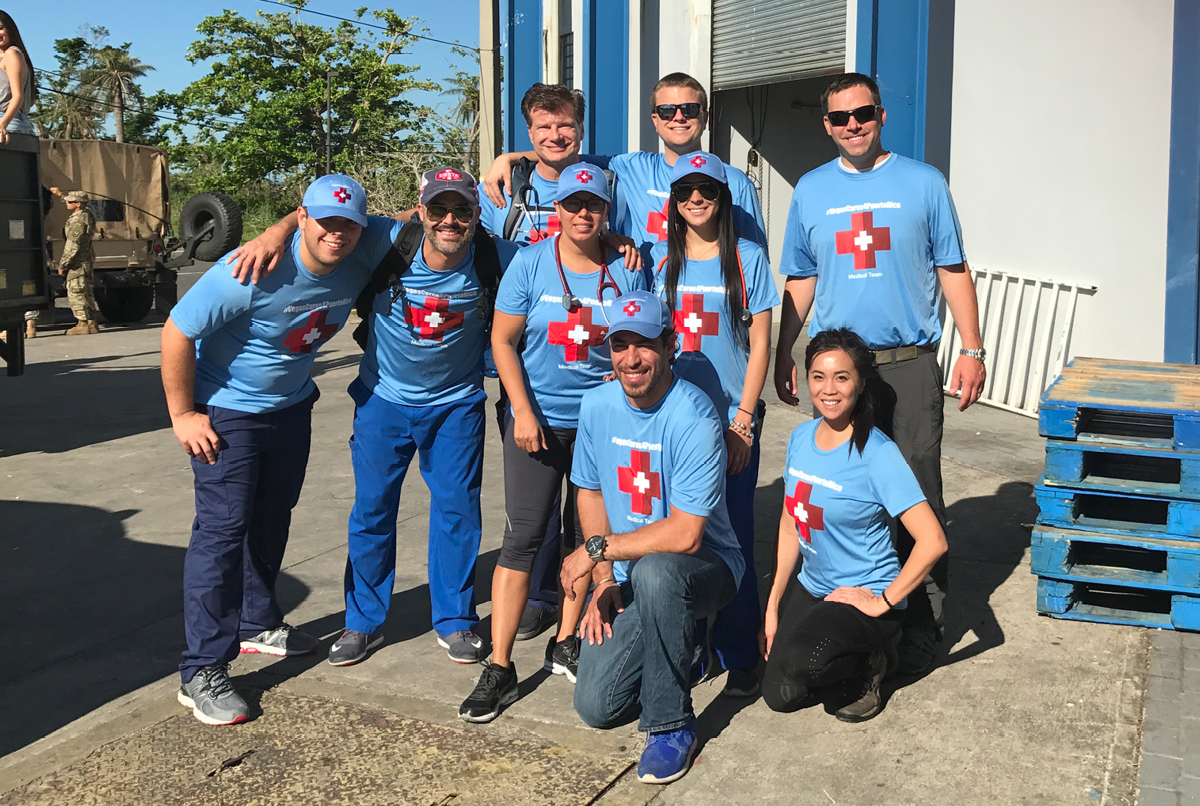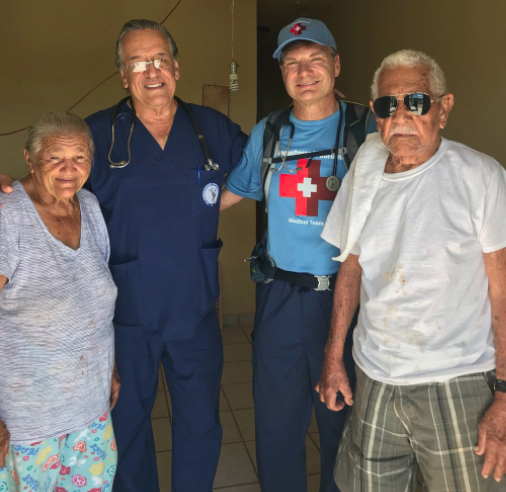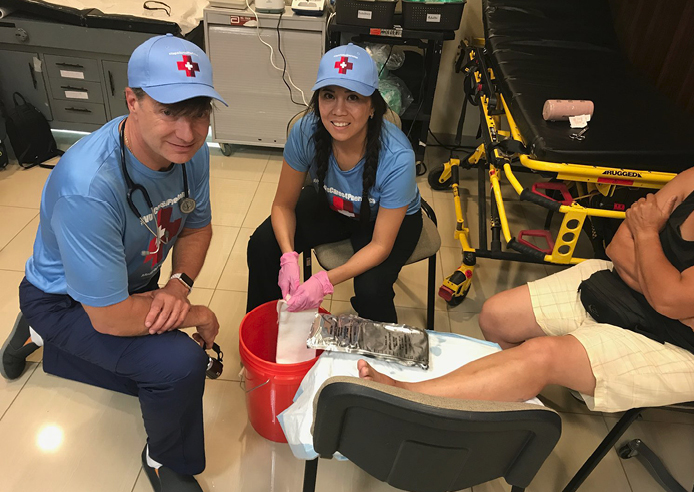Island Relief!

#vegascares4puertorico team members with Dr. Volker (top row center).
Puerto Rico – a tropical Caribbean island with white sandy beaches, mountains, a rainforest, and a charming residential and commercial district that has evolved out of a 500-year-old neighborhood in the capital city of San Juan.
If that description of the U.S. Territory 1000 miles from Miami sounds like a tourist’s vacation paradise, it is : Until 2017, nearly 4 million people visited the island annually, supplying approximately $1.8 billion each year to the Puerto Rican economy.
Years ago, Dr. Warren Volker, the chief clinical officer of Davita Medical Group-Healthcare Partners of Nevada, as well as a clinical professor of minimally invasive surgery at the UNLV School of Medicine, had heard all about the beauty of the island from friends, colleagues, and students. He hoped to vacation there one day.
But when Volker did go to the island, it wasn’t on vacation. It was on a medical mission that he organized in the wake of Hurricane Maria, which hit Puerto Rico in late September 2017. The Category 4 storm made landfall with winds close to 150 miles an hour and plowed a path of destruction across the island, killing nearly 3000 people and causing property damage estimated at $90 billion. Much of the island was without electricity for months.
Even before the media began its major coverage of the storm, Volker, who has regularly gone on medical missions to help the needy in Honduras, recently said he knew the hurricane was going to be devastating and he felt he had to help with the relief effort.
“I have taught several surgeons from the university in Puerto Rico and I was in contact with them. I also work with Boston Scientific (a medical device manufacturer) and they have a major center there...I was in communications with them as well,” Volker says now. “Everyone was telling me that the island was going to be destroyed, with thousands of people who were not going to be able to access medical care for months...I couldn’t stand the fact that there was going to be thousands of Puerto Ricans that would die if urgent medical care was not going to be available...When I saw...the TV news stories...I was even more moved to get to Puerto Rico.”
A couple of days after the storm’s landfall, Volker had assembled a team for the week-long medical mission. Dr. Jasmine Pedroso, an associate director of the minimally invasive surgery fellowship Volker created and that’s run through the UNLV School of Medicine, would be the second physician. Jessica Ortiz, a Puerto Rican native and a nurse anesthetist who worked on cases with Volker at Centennial Hospital, where he’s chief of staff, was brought along to help dispense medications. Volker’s son Alex, a Las Vegas-based commercial pilot, would fly the plane Volker would charter. Also set to make the trip were Alex Volker’s co-pilot, Ryan Lindley, and two representatives from Boston Scientific, Dallas-based David Solero, a Puerto Rican native, and Jordan Councill of Salt Lake City – both men agreed to help distribute supplies, many of them donated by the device manufacturer which has about 1000 employees in Puerto Rico.
“We were scheduled to go on Oct. 5,” says Volker, who was coordinating his mission through disaster relief officials with the help of U.S. Senator Catherine Cortez Masto, D-NV., and Steve Sisolak, then the chair of the Clark County Commission. “Everything was set.”
But the deadliest mass shooting committed by an individual in the history of the United States changed those plans. On the night of Oct. 1, Stephen Paddock opened fire on a crowd of concert goers at the Route 91 Harvest Music Festival on the Strip, killing 58 people and leaving 851 injured before turning the gun on himself. In his leadership capacity with both Healthcare Partners and Centennial Hospital, Volker was called on to help coordinate care for the injured.
It wasn’t until almost a month later that Volker’s team was on their way to Puerto Rico. That Volker, now in his 50s, could fund the mission himself, is testimony to his business acumen.
As an undergraduate at the University of North Dakota – where Volker also received his medical degree and a PhD in molecular biology – he majored in both natural sciences and finance.
“My undergraduate work in financial management has been indispensable in helping me navigate the complex world of healthcare finance,” he says.
Three years after completing an OB-GYN residency through the University of Nevada, Reno Medical School, where he became a member of the faculty and directed the school’s research, Volker started Women’s Specialty Care, a Las Vegas clinic where he was CEO and managing partner. That single clinic eventually morphed into 16 and become known as WellHealth Quality Care. In 2017, Davita Medical Group-Healthcare Partners acquired WellHealth and asked him to stay on as chief clinical officer.
While directing his clinics, Volker also helped develop the McCarus-Volker Fornisee System, one of the most used surgical devices in women’s health care. In 2006, when doctors were finding it difficult to obtain malpractice insurance, Volker also found time to found Premier Physicians Insurance Company. In 2017, after Premier Physicians became one of the five largest malpractice insurance companies in Nevada, he sold it. He has used his financial success in healthcare to start a nonprofit foundation which funds endeavors that include a UNLV School of Medicine fellowship. “We need more specialty care in Nevada,” Volker says. Each year, the Graduate Medical Education Fellowship program has 60 young doctors from around the country vying for two spots. Most of the fellows, including Pedrosa, have stayed in Nevada.
“I have wanted to use my talents to help people,” says Volker, who plans on expanding his medical efforts internationally. “We need to do all we can to help the less fortunate.”
As Alex Volker flew the medical team into Puerto Rico on a twin turboprop, he remembers the airport looking “like a war zone.” Blackhawk helicopters, he said, “ were crisscrossing the airport and blue tarps were over houses and buildings where roofs had been...There was tons of military traffic...they were still trying to rescue people on the island.”
Shortly after the plane landed, nurse Ortiz found herself crying for her native land. “Cars were flipped over, houses blown away, buildings made of cement were crumbling down. Piles and piles of furniture outside. Walking through neighborhoods, I noticed people had carved their names into wood, so if they died during the storm people would know where they had lived.’
Medical and humanitarian supplies that Volker’s foundation had purchased for the mission had largely been flown ahead in cargo planes to the island offices of Boston Scientific, which was also donating materials. “It was amazing how many people in Nevada and elsewhere wanted to donate to our cause,” says Volker. “That is why I started the website https://vegascares4puertorico.org. “We raised hundreds of thousands of dollars for supplies.”
Dr. Pedroso recalls how the team – which stayed in a rented home without power – wore backpacks full of baby food, sanitary supplies for women, diapers, medications, and water filtration systems. Team members went door to door in remote areas outside the capital city of San Juan. “Because we were Americans, we were also able to write prescriptions, that were filled, for things like hypertension, diabetes, and heart conditions. We stitched up many lacerations. People needed so much a month after the storm.”
The team, which also treated people in a makeshift clinic, saw around 1000 men, women, and children. “The major issue we saw was listeria infections from contaminated water,” says Volker, of the condition treated with antibiotics. “More than half the island had no fresh water. We literally saw dozens of patients that had no choice but to drink water that was contaminated. There were also people with pneumonia and GI infections that hadn’t had access to antibiotics.”
One situation no one on the team can forget involved a woman who carried her 2-month-old child for two miles to get help at the pop-up clinic. The child, who’d been fed baby formula mixed with contaminated water, was lethargic and unresponsive. The mother, unable to breastfeed due to dehydration, fainted. Both were put on IV fluids and hurriedly sent to a hospital. “If we had not been there that day, both would have died,” says Volker, adding that both are doing well today.
Needless to say, the visit by Volker’s team was appreciated by Puerto Ricans.
“We in Puerto Rico are very grateful to them,“ said Dr. Stephanie Torres in a phone call from the island. “Many people they saw couldn’t get out of their homes for help.”
Gov. Sisolak, who closely followed the doctor and his team, noted that Puerto Ricans truly were moved by the medical mission.
“I’m grateful,” Sisolak says. “We have healthcare providers here in Nevada like Dr. Volker, whose compassion and expertise extend not only to our own communities in the state, but to families in need of care across the ocean...Dr. Volker’s medical mission to Puerto Rico makes the UNLV School of Medicine, and the entire State of Nevada, proud.”


Dr. Warren Volker and team provide medical assistance to Hurricane victims.
